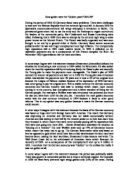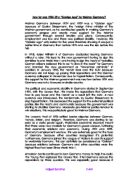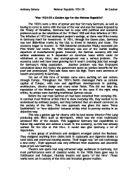The reparations were a big drain on the German economy. But Stresemann still decided to pay them. By doing this he was rewarded with firstly the French moving out of the Ruhr which gave the economy a lift and also many plans gave Germany more flexibility in paying reparations and they were also reduced. The Dawes plan gave Germany the flexibility of paying when they had the money too and it also agreed many U.S loans with Germany. The Young plan rewarded Germany for cooperation by reducing total reparations.
On the front of International Arguments the Locarna treaties were drawn up. These treaties made Germany promise to uphold its western boundaries. Germany happily abided.
With Germany ‘behaving so well’ they were allowed entry into the League of Nations, which had not allowed non-allied countries entry before. Stresemann also got the Nobel Peace Prize and the Kellogg pact was a treaty signed for no more war.
During the golden years international relations greatly improved by Stresemann making many compromises. This bought the Republic time to rebuild the country (and a secret army, which trained in Russia).
In many respect the Golden Years were a great time for Germany but there were some problems as well. With the payment of reparations resumed Germany was heavily dependant on short-term U.S loans. This meant that if the U.S decided to stop the loans then Germany would collapse again. Also the fact that short-term loans were given meant that America could ask for the money back any time. The problem was it had been invested in long term projects making it very difficult for the Germans to pay back some of their loans. Also not all industry was prosperous. With the introduction of supermarkets many small businesses went out of business. Also the agriculture started making to much produce, which drove down their prices and less profit was made.
Unemployment also rose and the effects of hyper-inflation were still present, the middle-class who had lost all their savings hadn’t had enough time to build them back up again.
The nationalists still opposed Weimar and they disliked the fact that passive resistance in the Ruhr was ordered to an end. Nationalists felt that this order made it look like their counterparts in the Ruhr had wasted their time in staging the protest and it seemed like another ‘stab in the’ moment. Also the government gave into international demands of paying reparations and promised to uphold western boundaries. The public opinion to this was that the government had given into the demand of the enemy. The ones who had killed many German soldiers a few years back.
People still didn’t fully support the Republic and this was shown by the election of Hindenburg as president. From this we can tell that people still had old views.
In conclusion I believe that Stresemann had a plan that was for the short-term. His measures wouldn’t have worked in the long-term. Germany couldn’t have kept up with reparation and arguments would have broken out with France, Britain and the U.S. Stresemann also relied heavily on U.S loans, which meant if ever the U.S pulled the plug then the German economy would have been left with nothing.
Also the measures that Stresemann took to make peace with the Allies didn’t go down very well with the public, meaning that other parties with the right polices could steal the vote.
It was always the German view to take revenge but with the amount of pacts Stresemann had made any military action would have made the allies show no mercy and would guarantee no sympathy.
All in all Stresemann’s plans were not the ones to follow in order to determine a prosperous future.







